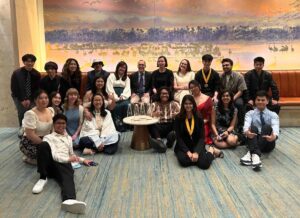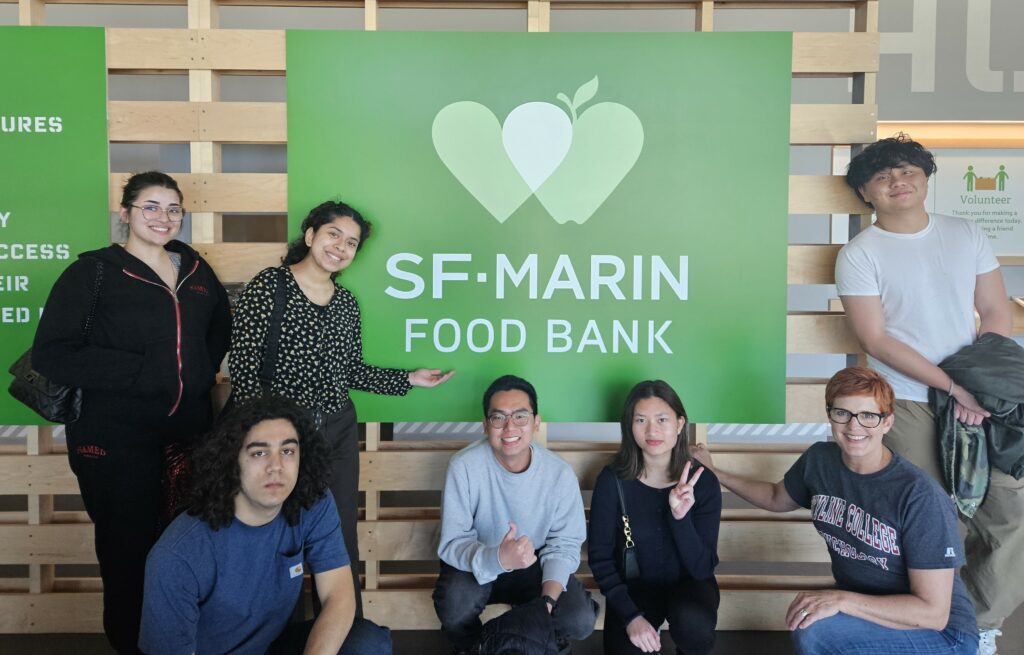 Four teams presented at the Strengthening Student Success Conference in Oakland from October 7- 9, 2015, highlighting Skyline College’s institutional work in teaching and supporting students with a social justice lens.
Four teams presented at the Strengthening Student Success Conference in Oakland from October 7- 9, 2015, highlighting Skyline College’s institutional work in teaching and supporting students with a social justice lens.
The Center for Innovative Practices through Hip Hop Education and Research (CIPHER) at Skyline College, led by counselor/coordinator, Nate Nevado, and English Instructor, Janice Sapigao, hosted their workshop titled, “Entering the CIPHER: Fresh Techniques, Hip Hop Elements, and Edutainment in the Classroom” to over 40 participants. In the workshop, participants were provided with an experiential and transformative learning environment that reflected on current modes of teaching that connects to social justice and Hip Hop pedagogy. Using concepts such as edutainment and kinetic consumption, we discussed best practices utilized in our Hip Hop learning community and provided participants tools to empower their students to become agents of change in their own communities as well as enhancing their reading, writing, and critical thinking skills.
Testimonials:
“Incorporating Hip Hop in the classroom can inspire more creative learning.”
“Social media can be an effective method in getting information to students in an engaging manner.”
“Kinetic consumption is powerful to build community and for students to participate and take ownership of the class.”
Comprehensive Diversity Framework: Developing Institutional Commitment to Equity through the Practice of Critical Inquiry
SEEED Presenters/ Facilitators: Angelica Garcia, Lucia Lachmayr, Aaron McVean, David Reed, and Karen Wong
Despite our interactive presentation being at 8:30 in the morning following the main conference, about fifty participants packed into the crowded room to hear about how Skyline College has been developing its institutional commitment to equity through the practice of critical inquiry. This presentation was the second on the Diversity Framework, the first being at last year’s conference. Angelica Garcia and Lucia Lachmayr began by providing the historical context out of which our current efforts arose. In Fall 2012, the Stewardship for Equity, Equal Employment and Diversity (SEEED) committee initiated a comprehensive, structured effort via forging a Diversity Framework, which employed an equity driven systems change model and identified eight domains for investigation, and has since informed our Equity Plan. Lucia and David Reed presented their findings on the student services domain, narrowing the focus to who was accessing services in the Learning Center. The many practitioners in the room helped to brainstorm ways to address the needs of the four groups that were underrepresented in proportion to their enrollment. Aaron McVean and Karen Wong presented on the second domain, leadership, one angle being the campus leadership’s practices as it relates to promoting an equity perspective, and another being on who constitutes our leadership and the factors that encourage or discourage faculty and staff to pursue leadership positions. Using i-clickers, participants answered some of the questions from our own campus’ survey, which gave participants insights on where their campuses stood in relation to other campuses, and worked in dyads to discuss follow-up questions that modelled how they could engage in such discussions on their respective campuses. The energy was high even after the session ended, which reinforced just how eager people are to participate in such discussions as they implement their equity plans with the hope that their entire campuses will be invested. SEEED committee members have begun dialoging about these results and look forward to engaging our own campus colleagues.
SparkPoint’s Measurement for Mitigating Economic Disparities
“Dr. Angelica Garcia, Heather Smith, and Julie Lamson delivered a presentation in the “Emerging Strategies” strand on Wednesday, October 7th. The presentation focused on SparkPoint at Skyline College’s innovative approach to mitigating economic disparities in higher education. The greatest predictor of bachelor’s degree attainment in the U.S. is family income, yet not all individuals have equal access to quality higher education. SparkPoint strengthens students’ financial capability and positively impacts persistence by providing free personalized financial education and coaching services, complemented by resources that allow individuals to meet their basic needs while in college. SparkPoint strategically collects data on each financial coaching client using Efforts to Outcomes software, which allows the organization to measure its impact in reducing poverty among its service population.
Participants shared personal testimonies and asked meaningful questions about best practices for replicating the SparkPoint model at their respective campuses. They seemed to agree that not enough is being done collectively by the 113 California community colleges to meet the needs of their changing student populations.
Investigating the “KA”: Strengthening the Bridge from High School to College via the Kababayan Learning Community Strand: Transforming the Pre-collegiate Experience
At the 2008 Strengthening Student Success Conference, Skyline College showcased the Kababayan Learning Community, which pairs English and counseling; assigns culturally relevant curriculum on the Filipino/Filipino-American experience; and reinforces the importance of pedagogical strategies, peer mentoring, and assessment as a means to motivate students. This year Marlboro Aelonar, Grace Burns, Liza Erpelo, and Kent Gomez provided an update of our work, primarily the addition of a college-level counseling course at a local high school, where the student population is approximately 40% Filipino. The presentation highlighted the need for not only culturally relevant instructional materials to facilitate student persistence and success, but also the creation of a stronger pipeline between high schools and colleges to address the unique challenges faced by Filipino and Filipino-American students pursuing higher education.
Article by Angelica Garcia






